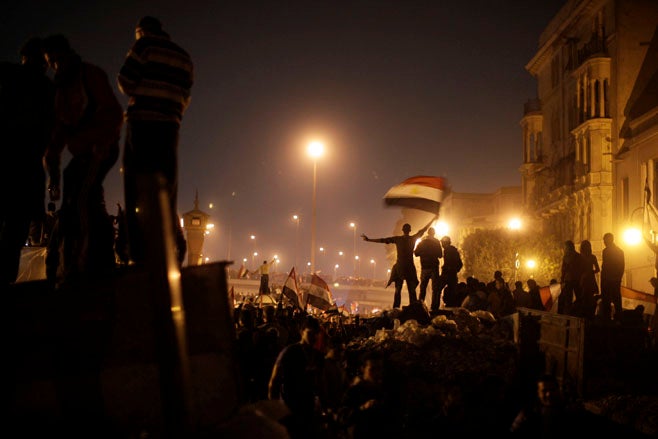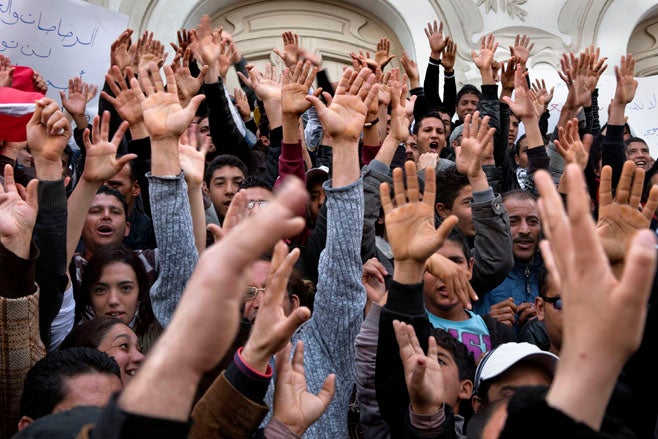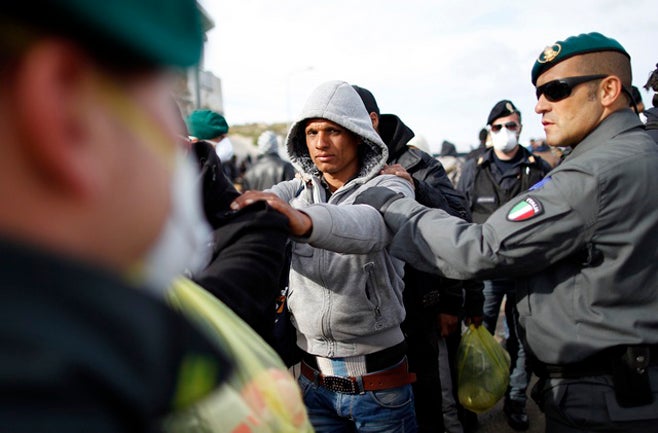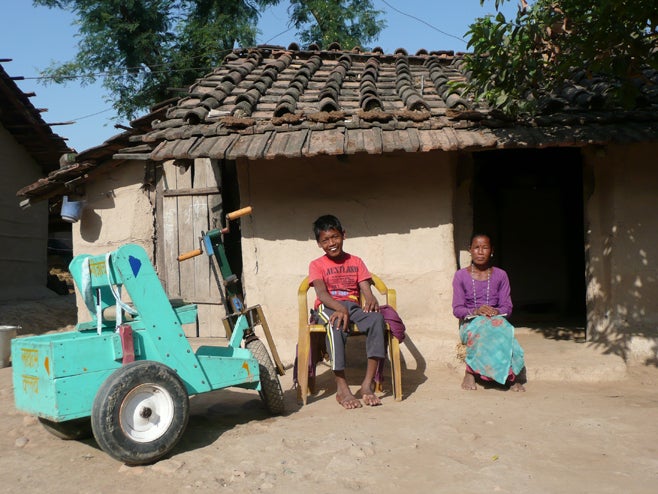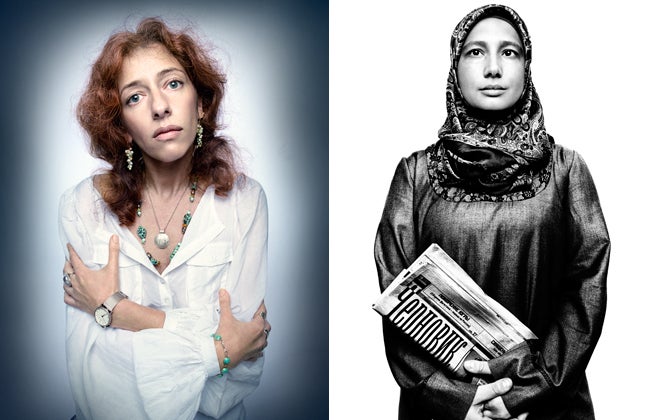Honduras failed in 2011 to hold accountable those responsible for human rights violations under the de facto government that took power after the 2009 military coup. Impunity remained a serious problem, despite the government’s establishment of a truth commission in May 2010 to examine events surrounding the coup, and efforts by the human rights unit in the Attorney General’s Office to investigate abuses.
Violence and threats against journalists, human rights defenders, political activists, and transgender people continued. Those responsible for these abuses are rarely held to account.
Lack of Accountability for Post-Coup Abuses
Following the 2009 military coup, the de facto government suspended key civil liberties, including freedom of the press and assembly. In the ensuing days the military occupied opposition media outlets, temporarily shutting down their transmissions. Police and military personnel responded to generally peaceful demonstrations with excessive force. This pattern of the disproportionate use of force led to several deaths, scores of injuries, and thousands of arbitrary detentions.
In July 2011 a truth commission, established by President Porfirio Lobo’sadministration to investigate events before and after the coup, delivered its report. The commissioners documented the cases of 20 people, 12 of whom they concluded had been killed due to excessive police or army force, and eight of whom had died in selective killings by government agents. The commission also reported that police and army officials were responsible for “systematic obstruction” of investigations into these abuses, including altering crime scenes and official documents, criminal negligence, and helping suspects escape.
According to information provided in October 2011 by the Human Rights Unit of the Attorney General’s Office, no one had been held criminally responsible for any of the serious abuses attributed to the security forces that occurred after the coup in the context of protests in support of Manuel Zelaya, the former president. Human rights prosecutors continue to face obstacles conducting investigations, including limited collaboration by security forces, lack of sufficient resources, and lack of implementation of a witness protection program.
Attacks on Journalists
Between President Lobo’s January 2010 inauguration and November 2011, at least 12 journalists died—including three in 2011—at the hands of unidentified attackers. Many victims had opposed the coup or reported on corruption or human rights abuses. Other journalists have received death threats.
In July 2011 Nery Jeremias Orellana, a 26-year-old radio journalist, was riding to work on his motorbike in Candelaria, Lempira department, when unidentified assailants shot him in the head. He died in the hospital a few hours later. Orellana managed Radio Joconguera de Candelaria, which reported on human rights abuses in the area and had frequently aired the views of coup opponents. He had reportedly received death threats.
The individuals responsible for most of these crimes have not been identified or charged. In March 2011 the minister for human rights told the United Nations Human Rights Council that four cases were in court and six were still under investigation. Several government officials, including the minister of security and the minister of justice and human rights, have rejected suggestions that the killings were related to the victims’ professional activities.
Rural Violence
More than 30 people were killed between January and August 2011 in the Bajo Aguan valley, a fertile palm oil-producing zone in northern Honduras. A long-simmering land conflict erupted in May when peasants occupied land being cultivated by large privately owned agricultural enterprises. Many victims were members of peasant associations who were allegedly gunned down by security guards working for the enterprises. In addition, four security guards were shot and killed in August 2011, when individuals armed with assault rifles and other arms reportedly tried to take over a ranch. In the absence of criminal investigations, the circumstances of each incident remained unclear. By September no one had been charged for the killings in the Bajo Aguán region.
Excessive Use of Force against Demonstrators
There were credible reports in March 2011 that members of the national police fired tear gas canisters indiscriminately and beat people with batons during demonstrations by teachers’ unions protesting proposed changes in the public education system. Ilse Velázquez Rodríguez, a teacher and member of a human rights organization, passed out after a tear gas bomb allegedly struck her forehead and was killed a few minutes later when a car ran her over.
Violence against Transgender Persons
Bias-motivated attacks on transgender people are a serious problem in Honduras. Six transgender women were murdered between November 2010 and January 2011 on the streets or in their homes in Tegucigalpa, the capital, and in the cities of Comayagüela and San Pedro Sula. The attacks ranged from gunshots to setting the victims on fire. Some victims appeared to have been tortured before being killed. Four additional murders of transgender women have been documented by local rights advocates between January and November 2011.
The alleged involvement of members of the Honduran police in some of these violent abuses is of particular concern. They are rarely followed by rigorous investigations, let alone criminal convictions. In January 2011 the minister of justice and human rights condemned “hate crimes” against members of the lesbian, gay, bisexual, and transgender (LGBT) community. In February the government established a special unit in the Attorney General’s Office to investigate killings of transgender women among other vulnerable groups, and in November a similar unit was established in San Pedro Sula.
Honduras lacks anti-discrimination legislation, and current criminal laws expose LGBT community members to arbitrary arrest for vaguely defined conduct such as “offenses against decency.”
Judicial Independence
Until recently the Supreme Court enjoyed absolute powers over personnel matters. In May 2010 it abused these powers by firing four judges who had publicly opposed the coup on grounds that they had participated in politics, while taking no action against judges who had publicly supported the ouster of former President Zelaya. In August 2011 the Council of the Judicial Career upheld the dismissal of three of the judges, ordering monetary compensation for only one of them, and reinstated the fourth judge.
In February 2011 the Honduran Congress approved constitutional reforms creating a new body, the Council of the Judiciary and Judicial Career, an elected body responsible for appointing and dismissing judges. In November 2011, after long delays due to political disagreements, Congress approved key articles of a law regulating the council’s membership and powers. Legislators agreed not to include a representative of the executive branch on the council, whose five members would be elected by Congress after public hearings.
Human Rights Defenders
Government officials have sometimes fueled hostility among some sectors of the public towards human rights advocates who defend the rights of victims of police abuses. In May 2011 the head of the Human Rights Unit of the Attorney General’s Office, Sandra Ponce, received intimidating text messages after the deputy minister of security publicly criticized her for opening an investigation into the deaths of seven alleged youth gang members in Ciudad Planeta, near San Pedro Sula.
Leo Valladares, one of Honduras’s most distinguished human rights advocates and a former president of the Inter-American Commission of Human Rights, told Human Rights Watch that he had received intimidating phone calls, and noticed people monitoring his home and following him after he questioned the increasing power of the Honduran military since the 2009 coup.
Key International Actors
In June 2011 the Organization of American States General Assembly voted to readmit Honduras, having suspended its membership immediately after the 2009 coup. A few days earlier Zelaya returned to Honduras from exile after a Honduran appeals court dropped corruption charges against him.
In June 2011 the Center for Constitutional Rights filed a complaintunder the United States Alien Tort Statute against former de facto president Roberto Micheletti on behalf of the parents of Isis Obed Murillo, a teenager who was shot and killed by members of the Honduran military in July 2009 during a demonstration against the coup. At this writing the civil action was pending before a US District Court in the Southern District of Texas.
The Inter-American Commission on Human Rights has played a critical role in Honduras since the coup, producing comprehensive reports documenting abuses, including killings, threats, and attacks on journalists.
Since August 2010 the Office of the UN High Commissioner for Human Rights has maintained a human rights advisor in Honduras, who provides advice to the government on strategies to protect and promote human rights, and advice and support to civil society groups defending human rights.
President Lobo continued in 2011 to support the creation of a UN-backed international commission against impunity in Honduras, in the context of international efforts to assist governments combating organized crime, drug-trafficking, and corruption in Central America.
